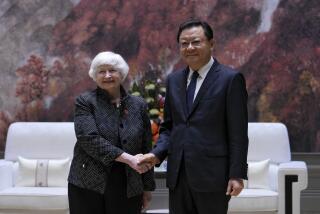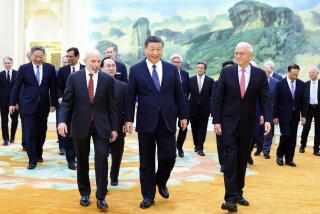President Xi Jinping says China needs 6.5% economic growth to prosper
President Xi Jinping said Tuesday that China needs at least 6.5% economic growth in coming years to become “moderately prosperous.” The ruling Communist Party also announced plans to let the country’s tightly controlled currency trade freely by 2020.
The announcements follow a high-level planning meeting last week at which ruling party leaders promised to make the world’s second-largest economy more productive and to raise living standards.
Xi said growth of “no less than 6.5%” is required to achieve the party’s goal of doubling the economy’s size by 2020 from its 2010 level, the official Xinhua News Agency said.
Chinese growth has slowed steadily over the last five years as the ruling party tried to steer the economy to a more sustainable expansion based on domestic consumption instead of trade and investment. An abrupt decline over the last year prompted Beijing to try to shore up growth by cutting interest rates six times since last November.
Xi’s comment was the latest indication that the party might reduce its official growth target, which has been 7% since 2011. Last year’s economic growth was 7.4% and this year it is expected at just below 7%.
Private sector analysts have warned that sticking to a high target could conflict with official efforts to shift China to more sustainable growth based on domestic consumption instead of trade and investment. Some say a more realistic level would be 5.5% to 6%, which still would rank China among the fastest-growing major countries.
Xi said “maintaining a medium-high level of growth” was required for “comprehensively building a moderately prosperous society,” according to Xinhua. China’s gross domestic product is about $8,000 per person compared with $55,000 for the U.S. and $36,000 in Japan.
Last week, the ruling party eased its birth limits to allow all couples to have two children in a response to the need for more young workers in a rapidly aging society.
On Tuesday, the party also said its leaders agreed last week to make the yuan a “freely tradable and freely usable currency” by the end of their next five-year development plan in 2020.
The United States and other governments have pressed Beijing to end controls that they complained kept the yuan undervalued, giving Chinese exporters an unfair price advantage. Some U.S. legislators had demanded punitive tariffs on Chinese goods in retaliation.
Beijing has been gradually expanding use of the yuan abroad for trade but restricts the daily movement of its exchange rate and the flow of money into and out of China.
Chinese leaders have said they eventually would allow the yuan to be freely traded. But they said that would require extensive reforms to China’s state-run financial system to make banks and other entities capable of coping with more abrupt changes in interest rates and financial flows that might be the result.





